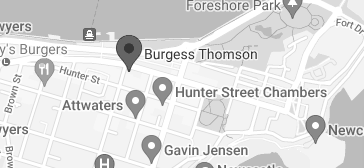Business Structures
Business & Commercial
Newcastle's leading experts in legal business advice
The most common business structures used by Australian businesses are:
- Sole Trader
- Partnership
- Company
- Trust
It’s important to understand the responsibilities of each business structure. A structure of a business may affect the tax you are liable to pay, asset protection and the costs involved. However, you are not locked into any structure and can change the structure as your business grows and develops. Choosing the most appropriate business structure from the beginning is key to the future success of your business.
At Burgess Thomson we can help guide you through the complex legal and taxation issues involved in setting up a business structure. We provide specialist advice on the best way to structure your business for your particular circumstances. We then develop a strategy that will ensure its ongoing success and viability. We can also review your existing business structure to help eliminate any issues and keep your business growing.
High-net worth family groups require specialised legal services to cater for the underlying structures and unique needs that wealth brings. This often includes an integrated use of underlying trusts, companies and other entities including self-managed superannuation funds.
We provide legal advice with respect to asset protection, business succession and estate planning, providing comfort to clients that their family wealth is best structured for the future.
GET A QUICK QUOTE
Enter your details for an obligation free quote.
LEARN MORE
Arrange a consultation with our Small Business Lawyers for sensible small business-focused legal advice.
FAQ's
What is a Sole Trader business structure?
A sole trader is an individual running a business. It is the simplest and cheapest business structure. If you operate your business as a sole trader, you are the only owner and control the business. This also means you are legally responsible for all aspects of the business. Your business’ debts and losses cannot be shared with other individuals. You can still employ workers in your business and must be responsible for paying their super and your own super. Through this business structure you may be eligible for small business tax offset.
What is a Partnership?
A Partnership is a group or association of people who carry on a business and distribute income or losses between themselves. This partnership business structure is appropriate if you and a friend or family member decide to set up a business together. A partnership is relatively inexpensive to set up and operate. The partners share income, losses, and control of the business. A partnership business will often involve a written partnership agreement. This outlines how income or losses will be distributed to the partners and how the business will be controlled. This agreement is important to prevent disputes about what each part brings to the partnership and what they are entitled to receive from the income of the business. This is particularly significant for tax purposes if the profit or losses are not distributed equally among the partners.
What is a company business structure?
A company is a legal entity with a higher set-up and administration costs. Companies also have additional reporting requirements. Companies are run by its directors and owned by its shareholders. A company provides less asset protection and directors can be legally liable for their actions, and sometimes, the debts of the company. Companies are regulated by the Australian Securities and Investments Commission (ASIC).
What is a trust?
A trust is a structure where a trustee carries out the business on behalf of the trust’s members (or beneficiaries). Setting up a trust requires a formal deed, which outlines how the trust will operate. This can be an expensive option. There are also formal yearly administrative tasks for the trustee running the trust. A trustee may be an individual or a company. The trustee is legally liable for the debts of the trust and may use its assets to meet those debts. However, if there is a shortfall, the trustee is responsible for the difference.



